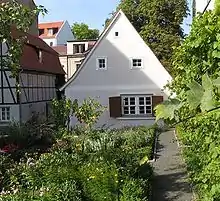Gohlis
Gohlis is an area in the north-west of the city of Leipzig, Germany. Only in 1890 was it absorbed into the city. It is known as the place where Friedrich Schiller worked on the second act of Don Carlos and wrote his first edition of the famous Ode to Joy.
Gohlis | |
|---|---|
Stadtteil of Leipzig | |
 Gohlis Palace | |
Location of Gohlis 
| |
 Gohlis  Gohlis | |
| Coordinates: 51°21′40″N 12°22′0″E | |
| Country | Germany |
| State | Saxony |
| District | Urban district |
| City | Leipzig |
| Area | |
| • Total | 5.4 km2 (2.1 sq mi) |
| Population (2010-12-31) | |
| • Total | 38,592 |
| • Density | 7,100/km2 (19,000/sq mi) |
| Time zone | UTC+01:00 (CET) |
| • Summer (DST) | UTC+02:00 (CEST) |
| Postal codes | 04157, 04155 |
| Dialling codes | 0341 |
Geography
The original settlement was located on the north east edge of the rivers Elster-Luppen-Aue, north of where the Nördlichen Rietzschke flows from the north east into the Parthe, and south of the old Schkeuditzer Landstraße (today's Georg-Schumann-Straße) between the city of Leipzig in the south east and the village Möckern in the north west.
History

The village Gohlis was probably founded by Slavic Sorbs in the 7th Century. Early forms of the name were Golitz, Goliz or Golis. The old Sorbian root gol meant bare, barren and is possibly a description of the unforested immediate hinterland of the village. The ending -its/-itz is typical for Slavic villages.
In the course of the German expansion to the east, Flemish settlers established themselves in the region. The first documented mention is in the year 1317, in which the village grant of land to the Cistercian monastery of St. George is mentioned.
The rulers of Gohlis were the Margraves of Meissen or rather, Landsberg and later the Ernestine Electors of Saxony (1423–1485), the Albertine Dukes, Electors and Kings of Saxony. Within Saxony, the village Gohlis belonged to the municipality of Leipzig.
The village Gohlis belonged to the seigneury (lordship) of the manor Gohlis, by which it was subject to patrimonial law. In 1659 the Leipzig Professor für Medizin Michael Heinrich Horn (†1681) acquired the manor and the seigneury of Gohlis. Since 1793, when the city of Leipzig became the owner of the manor, the underlying seigneury rests with the city, as it was not retained when the manor was sold in 1832.
In 1755/1756, the Leipzig Alderman Johann Caspar Richter (1708–1770) built a summer residence in rococo style in Gohlis. The so-called Gohliser Palace is nowadays used as restaurant and for cultural events.
Poet and playwright Friedrich Schiller spent the Summer of 1785 in Gohlis, working on the second act of his play Don Carlos, editing the "Fiesco" and writing the first version of Ode to Joy. The farmhouse in which Schiller lived is the oldest house standing in Gohlis. It was built around 1700 and has hardly changed since the 18th Century. In 1841 the Leipzig Schiller Society erected a memorial site which is now the "Schillerhaus" (Schiller house) museum.